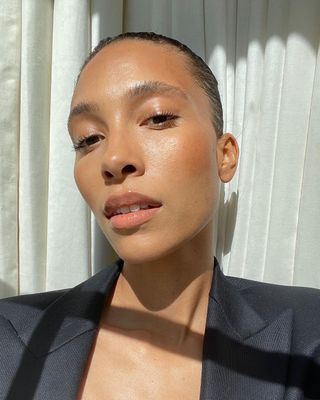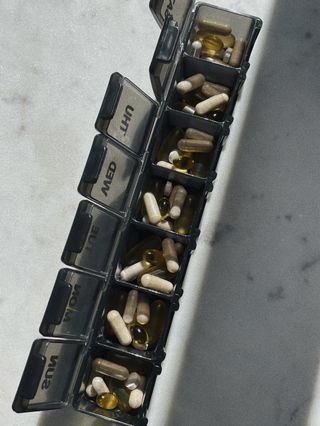
When you purchase through links on our site, we may earn an affiliate commission. Here’s how it works.
last updated 4 November 2022
With so much focus on which skincare products to use and which facial treatments to book, it can be easy to forget that achieving healthy skin isn’t just about what goes on your skin. I know this for a fact because despite having had access to a vast array of incredible products and regular facials over the past decade (the perks of being a beauty editor), I still consistently got breakouts. The truth is that serums, creams, masks and oils can only go so far because it’s (quite literally) what’s inside that counts.
According to Lorraine Perretta, head of nutrition for Advanced Nutrition Programme, topical skincare actually only provides 50% of the solution when it comes to achieving healthy skin. " That is why it is important to address skin ‘from within’ and to recognise that skin is a two-sided organ,” she adds. In addition, skin is also influenced by the health of the rest of our body. " Your visceral organs play a huge role in your skin, so negotiating with them is a major factor in the skin’s health,” explains skin and wellness expert Marie Reynolds. "For example, acne links to liver as well as with the ovaries, while sensitivity links with the stomach.”
When I first began to take supplements specifically with my skin in mind, I was sceptical. Supplements don’t have the instant gratification of a face mask or glow-boosting serum, so I didn’t see results straight away. But after around three months, I started to notice that my breakouts weren’t as frequent, my skin was much less textured, and I had more of an even all-round glow. This goes to show that while you don’t necessarily see results from the get-go, that doesn’t mean that the supplements you take aren’t working hard behind the scenes.

In fact, according to Perretta, it can take at least three months before the benefits become visible. "Each supplement is unique, and everyone is different, so some individuals start to see results earlier,” she says. It goes without saying that consistency and commitment pay off, so don’t make the mistake I initially did of disregarding a supplement because you finished your 30-day supply without noticing a complete transformation.
Some might argue that the nutrients provided by food should suffice, and of course, a diet naturally rich in vitamins and minerals is ideal, but it’s not always achievable. "D iets low in fruits and vegetables, omega-3 fatty acids, and high in refined carbohydrates, saturated fat and salt may cause abnormalities to our skin structure and function,” explains Alex Glover, senior nutritionist at Holland & Barrett. This is where supplements come in. Boosting your diet with specific ingredients that have proven skincare benefits can help to fill in the gaps and allow you to adopt a fully holistic 360-degree approach to skincare.
So where to start? While the world of skincare products can be overwhelming, it has nothing on the supplement market. In the UK, supplements are classed as foodstuffs, which means they come under a completely different set of rules and regulations to skincare products. You’ll notice this in the way they’re marketed, with an emphasis on research-backed evidence over results-driven descriptions. This means that it’s not always super easy to figure out how a supplement might benefit your specific skin type and concerns.
Here's where I come in. Whether your skin is dry, oily, ageing or breakout-prone, I've done the hard work for you and curated the ultimate edit of skin supplements to shop now.
Perretta describes omegas as essentially acting like internal moisturisers. "They provide support for all skin types, but I’d highly recommended them for dry skin or those impacted by winter skin changes,” she adds. Aside from improving moisture levels, omega-3 has also been proven to help reduce overall inflammation, so it can help to counteract redness and even reduce breakouts.
Omegas to look out for include GLA or linoleic acid (omega-6 fatty acids), which are found in evening primrose oil, and EPA and DHA (omega-3 fatty acids), which are usually derived from fish oil.